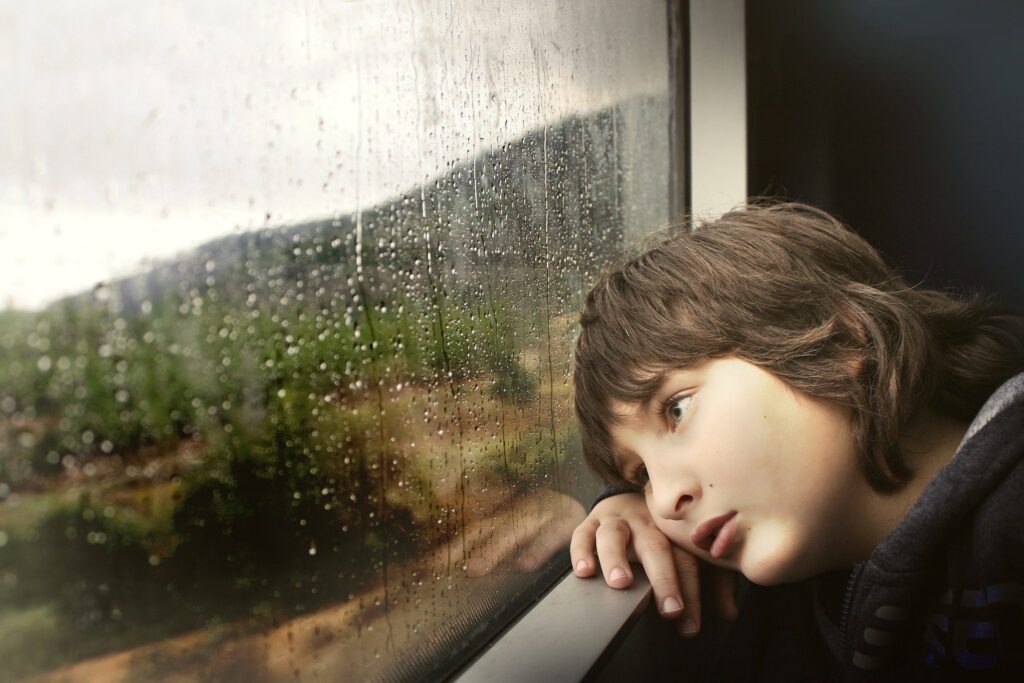Since the Covid-19 pandemic at the latest, no parent will have difficulty imagining that childhood trauma is affecting our emotional and behavioural development.
The term childhood trauma summarizes:
- child abuse,
- sexual abuse of children,
- severe neglect,
- war experiences,
- separation / divorce of parents and other family / social stress factors.
Trauma is a serious psychological injury. Traumatic events do not always leave physical scars, but often emotional and psychological ones. Those imprints can affect a child’s mental and physical health for years to come — and even into adulthood. Child health experts often talk about adverse childhood experiences (sometimes called ACEs) — traumatic events in a child’s life.
Some ACEs are clearly terrifying — such as abuse, witnessing extreme violence or surviving a natural disaster.
But kids see the world differently than adults do and can experience distress from things that might not seem so scary to grown-ups. Events like chronic bullying at school, the death of a family member or divorce can also traumatize a child.
Parents must be aware that even though an event might not seem traumatic to them, it may have been traumatic for their child.
Childhood trauma: lingering effects of stress
- Childhood trauma: lingering effects of stress
- Age
- Level of trauma
- Duration of trauma
- Effects of childhood trauma
- Childhood trauma: physical responses
- Childhood trauma emotional responses
- Childhood trauma: support and treatment
- Hear what your child is saying
- Watch for clues
- Talk it out
- Childhood trauma – ask for help
- Childhood trauma – take care of yourself
Many children who experience an adverse event don’t have long-lasting effects. Still, some factors increase the chance of later problems.
Age
Trauma can leave a stamp at any age. But children who experience an adverse event before the age of 8 may be particularly vulnerable.
Level of trauma
Overall, the more extreme the trauma, the higher the risk for lasting difficulty.
Duration of trauma
Chronic or repeated exposure to adverse events increases the risk of lasting health problems. Children who witness repeated violence in an unsafe neighbourhood, or those who are abused, are more likely to have long-term problems than a child who experiences a one-time event, such as a car crash.
Effects of childhood trauma
Meanwhile, research on how adversity affects children’s developing brains shows that adverse childhood events (ACE) drastically increase the risks of cardiovascular disease, cancer, and lung disease later in life. Emotional stress is linked to the body, particularly during the critical developmental period in children.
Thus, past traumas can stay with a child — and even affect their physical health. Children who experience traumatic events have a greater chance of developing health conditions, including:
- Anxiety
- Cancer
- Depression
- Diabetes
- Heart problems
- Obesity
- Post-traumatic stress disorder (PTSD)
- Stroke
- Substance use disorders
There are two main ways that trauma can cause those lingering effects:
Childhood trauma: physical responses
The body responds to emotional stress in much the same way it responds to physical stress.
Elevated proteins
After a concussions, levels of a protein called S100B can spike in the brain. Researchers found similarly high levels of this protein in children who had experienced emotional trauma. S100B is associated with potentially damaging inflammation in the brain.
High levels of stress hormones
Stress affects the hole body. When something scary happens, stress hormones set our heart racing and make us break into a cold sweat. But if those hormones stay elevated for a long time, they can cause inflammation in the body and lead to lasting health problems. The stress response can wear on our bodies.
Childhood trauma emotional responses
Sometimes, significant stress or trauma can lead to mental health disorders, such as anxiety and depression. And people with untreated mental health problems are
- at increased risk for disease
- less likely to make healthy choices, like seeing the doctor regularly or eating well
- more likely to turn to unhealthy coping mechanisms, such as drinking and smoking
The biological changes that result in the activation of stress responses lead not only to the increased risk of medical problems, but to a dramatic increase in the risk of engaging in high-risk behaviour. In fact, a person with four or more ACEs is 10 times as likely to use IV drugs as a person who had none! Some of that has to do with the environment we are in, but some of it has to do with how changes in the brain, particularly the reward pathways, increase the risk of substance dependence.
Childhood trauma: support and treatment
If you’re caring for a child who has survived trauma, you might be feeling overwhelmed by all the possible outcomes. It’s worth repeating: Those outcomes aren’t inevitable. As a caregiver, you can take steps to reduce the risks for your child.
Hear what your child is saying
Sometimes, adults minimize the significance of a traumatic event such as bullying. You may be trying to help your child by taking the “it’s not so bad” approach. But trauma might make your child shut down — when you want them to let you in. Validate your child’s experience. Let them know that you understand how hard the experience was and that you’re there to help.
Watch for clues
It’s not always easy for children to explain what they’re thinking. After a distressing event, look for changes in behaviour. These can be clues that your child is having a difficult time. Some common changes to watch for include:
- eating more or less than usual
- sleep changes, including having trouble sleeping or needing more sleep than usual
- regression (such as a potty-trained preschooler having accidents again, or a toddler who slept through the night now waking frequently)
- Irritability and grumpiness
- Clinginess and separation anxiety — especially in younger kids.
Talk it out
Encourage opportunities for discussion and have kids express their thoughts and feelings by play or drawing.
Childhood trauma – ask for help
Mental health professionals can use tools such as trauma-focused treatments to help children recover from trauma. Not sure where to ask? Talk to your pediatrician for recommendations.
Childhood trauma – take care of yourself
If your child has been through a trauma, there’s a good chance the experience was stressful for you as well. Make sure you’re getting the support you need and engaging in healthy behaviours. If you’re having difficulty coping, seek help for yourself, too.
It’s never too late to deal with childhood trauma. If you recognize that your own ACEs dealt you a bad hand and that you are still dealing with the emotional and physical consequences, help is available at any age. There are a variety of therapies that are very effective at treating anxiety, depression and PTSD.
Sources:
How Childhood Trauma Affects Health Across a Lifetime
Pediatrician and TED Speaker Nadine Burke Harris on Treating the “Whole Person”
health.cleveland.clinic.org: Childhood Trauma’s Lasting Effects on Mental and Physical Health. How to help children recover and thrive after adversity. April 28, 2020.
Childhood Trauma’s Lasting Effects on Mental and Physical Health




